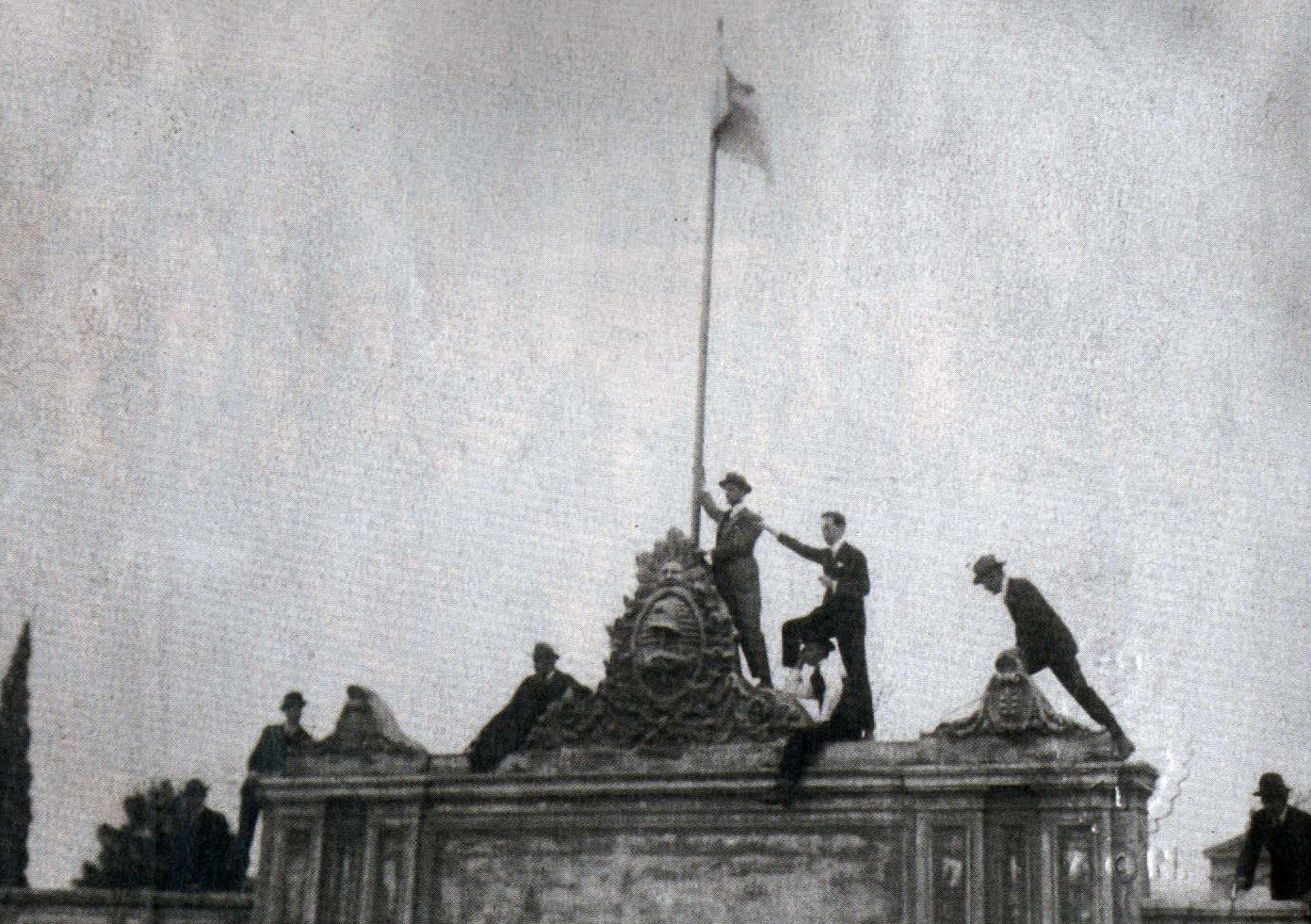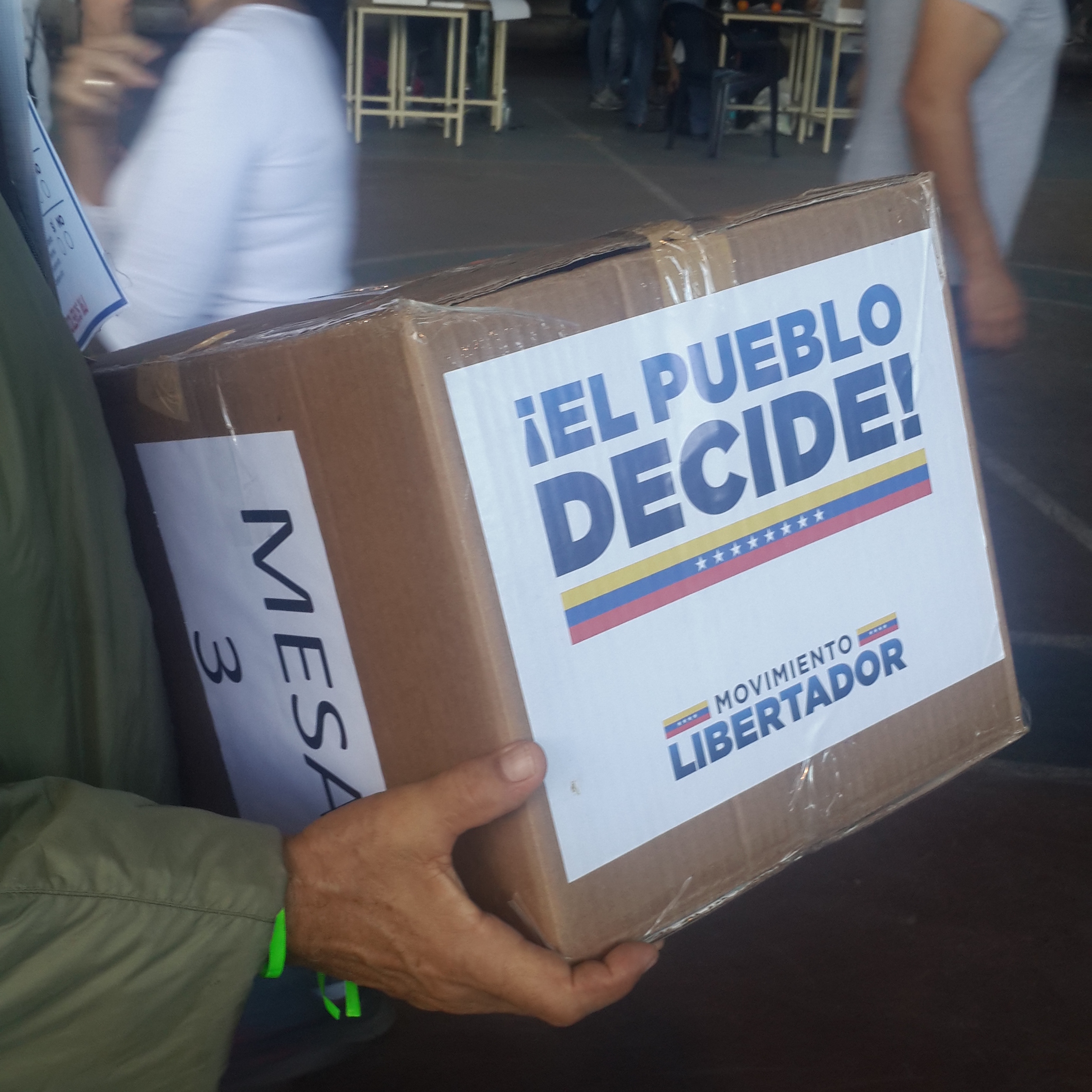|
Voto Joven
Voto Joven is a Venezuelan non-government organization whose purpose is to promote electoral registration and participation, as well as the correct development of electoral processes. It is made up of university students, community leaders, workers and political party activists and was created in later 2009 to promote political participation in the 2010 parliamentary elections. History The organization is known for having motivated approximately 750,000 young people to register to vote in the first four months of 2010, a figure that was matched in the country in the previous three years. In the early morning of the day of the 2010 parliamentary elections, members of Plan República raided a Voto Joven complaint center that had been installed at the Simón Bolívar University, entering with assault weapons and taking three computers, without a search warrant and in violation of university autonomy. Voto Joven assisted the 2017 Venezuelan consultation process, along with org ... [...More Info...] [...Related Items...] OR: [Wikipedia] [Google] [Baidu] |
2010 Venezuelan Parliamentary Election
The 2010 parliamentary election in Venezuela took place on 26 September 2010 to elect the 165 deputies to the National Assembly of Venezuela, National Assembly. Venezuelan opposition parties, which had boycotted the 2005 Venezuelan parliamentary election, previous election thus allowing the governing Fifth Republic Movement (MVR) to gain a two-thirds super majority, participated in the election through the Coalition for Democratic Unity (MUD). In 2007 the Fifth Republic Movement dissolved and the United Socialist Party of Venezuela was formed as the leading government party. Nationally, the popular vote was split equally between PSUV and MUD, but PSUV won a majority of the first-past-the-post seats and consequently retained a substantial majority in the Assembly, although falling short of both two-thirds and three-fifths super majority marks.Devereux, Chrlie and Corina Rodriguez Pons. ''Business Week'', 27 September 2010."Venezuela's Opposition Pushes Back Chavez in Vote"./ref ... [...More Info...] [...Related Items...] OR: [Wikipedia] [Google] [Baidu] |
Simón Bolívar University (Venezuela)
The Simón Bolívar University (Universidad Simón Bolívar in Spanish) or USB, is a public institution divided in two branches, one in Miranda State, Miranda state and one in Vargas (state), Vargas state, with scientific and technological orientation. The Simón Bolívar University is arguably the most prestigious science and technology university in Venezuela and one of the most important ones in South America. It is the most selective higher education school in the country admitting only the 95th percentile of its standardized admission test. The university began academic activities in 1970 in the Sartenejas Valley in Caracas and seven years later in Camurí Grande Valley, Vargas (state), Vargas. Currently has these two locations. Its rectory is Sartenejas headquarters, located in the Baruta municipality of Miranda state. The USB has graduated approximately 25,000 engineers, architects, urban planners and graduates, along with 5,000 specialists, masters and doctors. According ... [...More Info...] [...Related Items...] OR: [Wikipedia] [Google] [Baidu] |
Autonomous University
Autonomous university typically refers to a university that exercises a high degree of autonomy from the state. The main dimensions of university autonomy are academic, organizational, financial and staffing autonomy. The 1988 Magna Charta Universitatum defines the first fundamental principle of a university to be an "autonomous institution" whose "research and teaching must be morally and intellectually independent of all political authority and economic power". Different countries have their own implementation of university autonomy. By country China In 2011, the Southern University of Science and Technology launched in Shenzhen, Guangdong. It was marketed as China's first "autonomous" university, though the level of autonomy from state institutions is disputed. Latin America Many Latin America, Latin American countries and their universities have been affected by authoritarian dictatorships. Argentine university reform of 1918, Student revolts starting from the Nationa ... [...More Info...] [...Related Items...] OR: [Wikipedia] [Google] [Baidu] |
2017 Venezuelan Referendum
A referendum was held in Venezuela on 16 July 2017. The referendum was called by the National Assembly in response to the constitutional crisis and President Nicolás Maduro's plans for a Constituent Assembly. The referendum was an act of civil disobedience in the context of the application of Articles 333 and 350 of the Venezuelan constitution, with the articles calling for Venezuelans to "disown any regime ... that violates democratic values", especially since the National Electoral Council and the Supreme Tribunal of Justice were not recognized in the referendum. The opposition Democratic Unity Roundtable (MUD) announced that there would be 2,030 areas for the popular consultation nationwide to serve more than 19 million voters. Background Constitutional crisis On 29 March 2017, the government-filled Supreme Tribunal of Justice (TSJ) attempted to assume the powers of the opposition-led National Assembly, though the TSJ later reversed their decision. Despite this, protests ... [...More Info...] [...Related Items...] OR: [Wikipedia] [Google] [Baidu] |
Súmate
''Súmate'' ( Spanish for "Join Up") is a Venezuelan volunteer civil association founded in 2002 by María Corina Machado and Alejandro Plaz. ''Súmate'' describes itself as a vote-monitoring group; it has also been described as an election-monitoring group. Mission and values ''Súmate'' is a non-governmental organization (NGO) whose stated aim is to promote the free exercise of citizen's political rights, and the discussion of matters of public interest. The group's mission is to promote, defend, facilitate, and back the political rights accorded to citizens by the Constitution of Venezuela. ''Súmate's'' espoused values are: * The guarantee of civil and political freedom and rights * Impartial and independent citizen participation in democratic processes * Professional volunteerism with a high level of citizen participation * Organizational transparency and efficacy Other projects are the consolidation of a national network of volunteers; analysis of voter registration; ... [...More Info...] [...Related Items...] OR: [Wikipedia] [Google] [Baidu] |
A Whisper To A Roar
''A Whisper to a Roar'' is a 2012 American documentary film made by Ben Moses and inspired by the work of Larry Diamond. The film chronicles the fight for democracy in Egypt, Malaysia, Ukraine, Venezuela, and Zimbabwe, and includes animated segments narrated by British actor Alfred Molina. Production Production of the film began in 2008 when Moses collaborated with Diamond and Diamond's former student Prince Moulay Hicham of Morocco and the team began filming in 2009. According to the film's website, Diamond "invited Moses to attend Stanford's Center for Democracy, Development and the Rule of Law’s annual Draper Hills Summer Fellowship on Democracy and Development Program, where democracy activists around the world gather to receive training and support for their work." At the program, Moses also began to gather funds for the project, only to be set back by the 2008 financial crisis. However, Prince Moulay Hicham agreed to fund the project in full soon after. Under Diamond's ... [...More Info...] [...Related Items...] OR: [Wikipedia] [Google] [Baidu] |
El País
(; ) is a Spanish-language daily newspaper in Spain. is based in the capital city of Madrid and it is owned by the Spanish media conglomerate PRISA. It is the second-most circulated daily newspaper in Spain . is the most read newspaper in Spanish online and one of the Madrid dailies considered to be a national newspaper of record for Spain (along with '' El Mundo'' and '' ABC)''. In 2018, its number of daily sales were 138,000. Its headquarters and central editorial staff are located in Madrid, although there are regional offices in the principal Spanish cities (Barcelona, Seville, Valencia, Bilbao, and Santiago de Compostela) where regional editions were produced until 2015. also produces a world edition in Madrid that is available online in English and in Spanish (Latin America). History was founded in May 1976 by a team at PRISA which included Jesus de Polanco, José Ortega Spottorno and Carlos Mendo. The paper was designed by Reinhard Gade and Julio Alonso. It wa ... [...More Info...] [...Related Items...] OR: [Wikipedia] [Google] [Baidu] |
Elections In Venezuela
Elections in Venezuela are held at a national level for the President of Venezuela as head of state and head of government, and for a unicameral legislature. The President of Venezuela is elected for a six-year term by direct election plurality voting, and is eligible for re-election. The National Assembly ''(Asamblea Nacional)'' has 277 members ''(diputados)'', elected for five-year terms using a mixed-member majoritarian representation system. Elections also take place at state level and local level. Since 1998, elections in Venezuela have been automated (using touch-screen DRE voting machines which provide a Voter Verified Paper Audit Trail), and administered by the National Electoral Council. The voting age is 18, and (as of 2011) 95% of eligible voters are legally registered. Prior to the early 1990s, Venezuela was considered an unusually long-standing and stable liberal democracy in Latin America, having transitioned to democracy in 1958. After the victory of socialist p ... [...More Info...] [...Related Items...] OR: [Wikipedia] [Google] [Baidu] |


